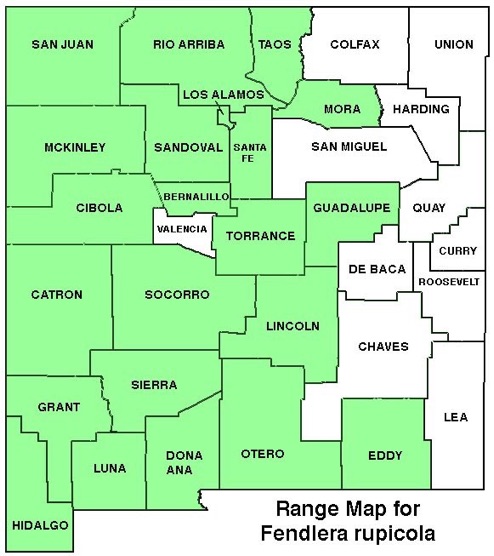WILDFLOWERS OF NEW MEXICO

Upright shrubs reach 3–9 feet tall (1–3 m) with intricate, thornless branches, shredding bark, and small leathery leaves with the edges rolled under. Note the showy, fragrant, 2-inch wide, white to faintly pink-tinted flowers with 4 spatula-shaped petals.
FLOWERS: March–June. Mostly solitary in leaf axils or clusters of 2–3 at branch tips; petals 4, white, 3/8–3/4 inch long (1–2 cm) by 1/4–1/2 inch wide (5-12 mm), spatula-shaped with the base abruptly tapering into a narrow claw. Fruit a 4-celled, oval, pointed capsule 1/4–5/8 inch long (7–15 mm).
LEAVES: Opposite or in fascicled clusters, stalkless (sessile); blades oblong to elliptic, 3/8–1 5/8 inches long (1–4 cm); edges entire, rolled under; surfaces sometimes hairy.
HABITAT: Dry rocky slopes, ledges, canyons, arroyos, blue grama grasslands; desert grasslands and scrub, pinyon-juniper woodlands, montane scrub.
ELEVATION: 5,600-8,000 feet.
RANGE: AZ, CO, NM, NV, UT, TX; Mexico.
SIMILAR SPECIES: Little-leaf Mock Orange, Philadelphus microphyllus, has flowers with 4 petals with rounded bases. Cliffrose, Purshia stansburyana, has tiny leaves, flowers with 5 petals, and seeds with long, hairy plumes.
NM COUNTIES: Nearly statewide except the eastern plains in medium elevation, dry, rocky habitats: Bernalillo, Catron, Cibola, Dona Ana, Eddy, Grant, Guadalupe, Hidalgo, Lincoln, Los Alamos, Luna, McKinley, Mora, Otero, Rio Arriba, San Juan, Sandoval, Santa Fe, Sierra, Socorro, Taos, Torrance.









CLIFF FENDLERBUSH
FENDLERA RUPICOLA
Hydrangea Family, Hydrangeaceae
Deciduous shrub



























THE CONTENTS OF THIS WEBSITE ARE COPYRIGHTED AND CANNOT BE USED
WITHOUT PERMISSION OF GEORGE OXFORD MILLER
















EMAIL ME


















The woody seed capsules split open and stay on the bush through the winter.









Showy flowers densely cover the shrub in the spring.
The 4 petals abruptly narrow at the base into a “claw.”



















Narrow, elliptic leaves are opposite on the branches (left) or in fascicled clusters right).


Shrubs have intricate, leafy branches that are heavily browsed by deer.
















